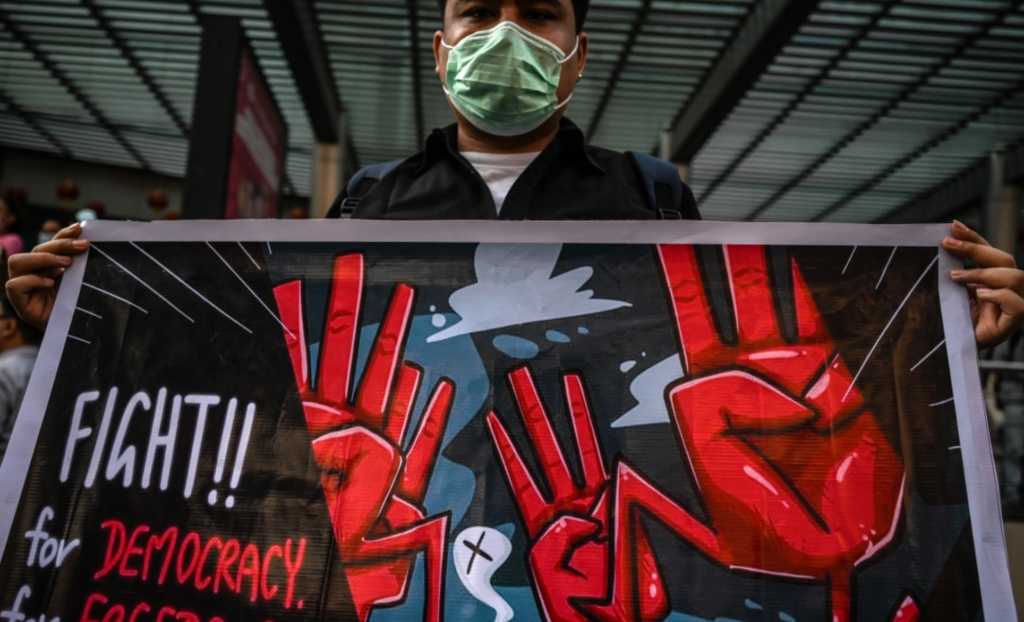By Lily Vining || Staff Writer

An attack on democracy has rattled Myanmar as a military coup disrupted the first convention of the elected governing body since November, following an election tainted by claims of voter fraud. The events of the week, including threats to a peaceful transfer of power, the silencing of media outlets, and the tension between public leaders all sound far too familiar to Americans in 2021.
On Monday, February 1st, the Myanmar military seized control of the nation’s government in a coup and immediately declared a national state of emergency. This action takes place following baseless claims of voting fraud in November’s election, spurred by the landslide victory of the National League of Democracy, the incumbent party. In the coup, State Counsellor Daw Aung San Suu Kyi was detained and tried for the illegal possession of walkie talkies, which could land her a sentence of up to three years. Following her removal, military leader Senior General Min Aung Hlaing was installed into command, bringing the country back to a state of totalitarian military rule known for five decades.
Interactions and power struggles between the military and governing body have long complicated the politics of Myanmar. Since 1962, the country had been run by military leaders in an oppressive system. It was during this time that Aung San Suu Kyi gained popularity for her opposition to military rule. Her speeches incited the public to such a great effect that the military government placed the political dissenter on house arrest for 15 years. In her confinement, Aung San Suu Kyi did not give up her struggle for democracy in her country, earning her a Nobel Peace Prize and solidifying her position as a champion for a free and democratic Burma. In 2015, the military government appeared to turn a new leaf by holding their first democratic elections, in which the National League for Democracy, the party of Aung San Suu Kyi, won a majority and gave command to the democratic figurehead of Myanmar.
While the 2015 election offered a glimmer of hope for democracy in the country, Myanmar’s military still held one-quarter control of the government, and even more leverage in political and social arenas. One instance in which the institution exercised its power was the genocide of Rohingya Muslims which flared up in 2017. The minority group experienced immense persecution due to their religion and origins. Eventually, the military took to ethnic cleansing through burning villages, mass rape, and executions in the Rakhine region. Estimates of up to 700,000 Rohingya people fled to Bangladesh, where they suffered from inhumane conditions in refugee camps, never to return to their homes. Throughout the crisis, de-facto leader Aung San Suu Kyi did not condemn the military’s actions and even defended them in a UN trial at the Hague in 2019. This behavior sparked outrage around the world, especially from world powers like the United States and European Union, who had previously supported her efforts to implement democracy. However, regardless of Ms. Aung San Suu Kyi’s failure to properly address the Rohingya Genocide, she continued to serve as a symbol of democracy for the majority of citizens supporting the NLD party.
Reactions both domestically and internationally have expressed outrage and fear over what is to come after the military’s power grab. Already, citizens’ lives are drastically changing. On the first days following the coup, citizens flocked to the streets of the former capital Yangon to stock up on food and other necessities in anticipation of the worst. The regime has put restrictions on television and telephone services, leaving only government-run or approved stations for news. As of this weekend, the internet in Myanmar had been completely shut down, with reports setting its return for Monday. This censorship, along with the detention of members of the NLD and other political dissenters, rehashes memories of the “dark days of Burma,” spreading fear within the citizenry. The security of the pseudo-democracy only just taking shape in the country is shaken for an indeterminate period of time.
International reactions from world powers like the United Kingdom and the United States have sought to penalize the government with sanctions to encourage the military to recognize the results of the election. However, in past attempts to isolate the nation economically to solve human rights violations, the consequences affected the citizens much more than the government. If the past repeats itself, sanctions and isolating measures will do nothing to change the state of the regime, as long as the military continues to profit through corrupt sources.
While the fate of Myanmar remains uncertain, social activists and political figures, including Aung San Suu Kyi, call for the country to resist military rule and continue fighting. Over the weekend, civilians took to the streets of Yangon in protest against the seated regime and called for Aung Sang Suu Kyi’s release. Even in the current bleak state, citizens in Myanmar refuse to give up hope for freedom and a return to democracy in the future.
First-year Lily Vining is a staff writer. Her email is lvining@fandm.edu.
